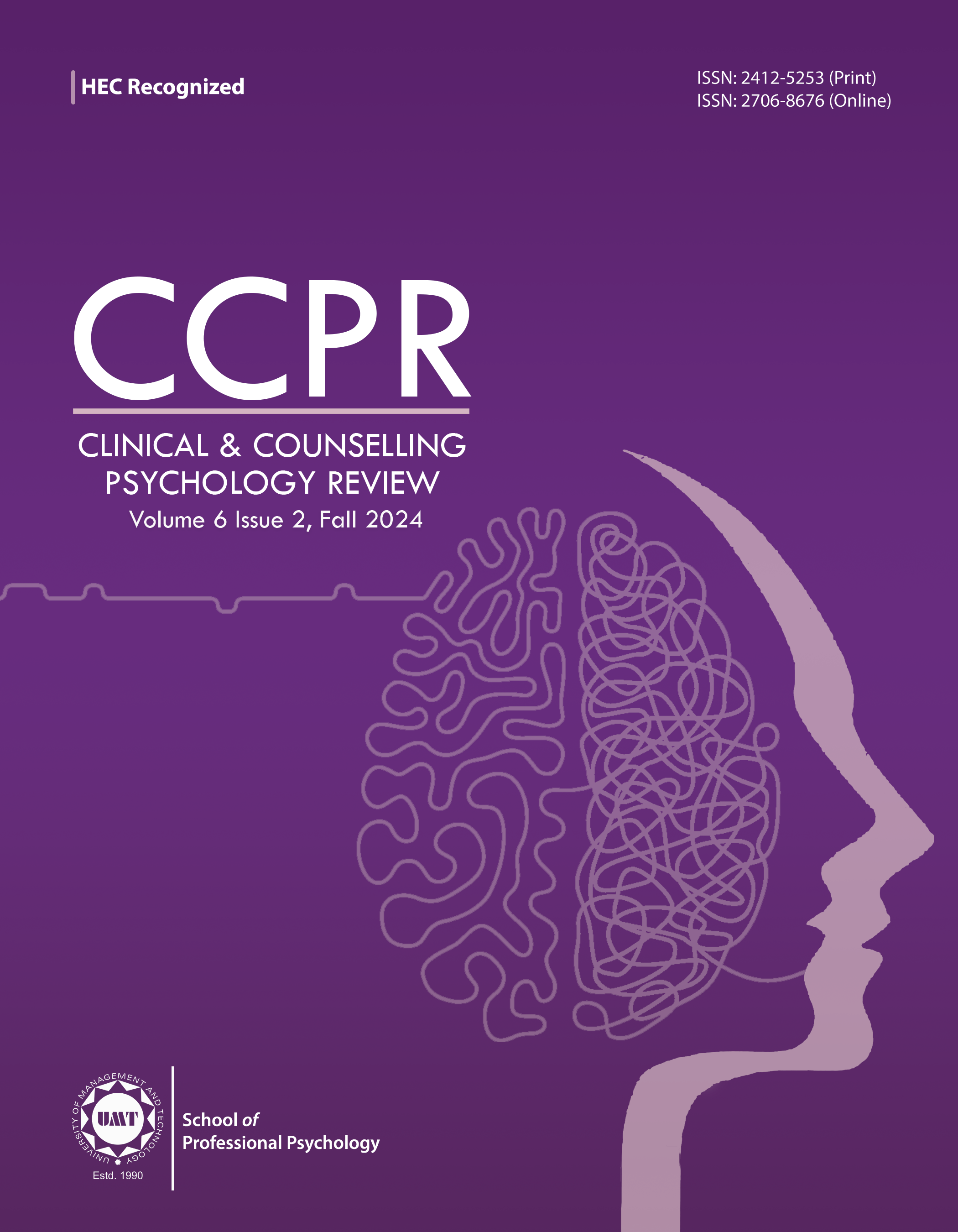Perceived Stress, Coping Strategies, and Well-being of Unemployed Adults in Pakistan
Abstract
 Abstract Views: 0
Abstract Views: 0
This study scrutinized the relationship between perceived stress, coping strategies, and well-being of unemployed adults in Pakistan. By using the purposive sampling technique, data were collected from 180 unemployed adults (men = 78%, women = 22%) within the age range of 20-40 years (M = 29.58, SD = 6.17 and M = 26.17, SD = 3.44 for men and women respectively). Urdu versions of the Perceived Stress Scale, Coping Strategies Questionnaire, and Mental Health Continuum-Short Form were used for data collection. Data were analyzed using descriptive statistics, reliability analysis, Pearson product moment correlation, hierarchical multiple regression, and independent sample t-test. The findings indicated that perceived stress is significantly but negatively correlated with well-being in unemployed adults. Whereas, coping strategies and their types are significantly and positively correlated with well-being and its domains in such adults. Similarly, perceived stress significantly but negatively predicted well-being. Whereas, active-practical coping significantly and positively predicted well-being and its subscales. While, avoidance-focused significantly but negatively predicted the emotional well-being of unemployed adults. Significant gender differences were found in well-being, emotional well-being, and psychological well-being of these adults. Additionally, significant differences in the emotional well-being of single and married unemployed adults were found to exist. This study aimed to assist the mental health professionals in the sense that they could guide unemployed individuals regarding how to cope with stress caused by unemployment in an effective way. Moreover, it also helped in the implementation of proper interventional programs to introduce adaptive ways of coping. The study also helped policymakers in planning and implementing better strategies to manage this issue in Pakistan.
Downloads
References
Adil, F., Shahed, S., & Arshad, H. (2017). The burden of being a man in a patriarchal society. Journal of Arts and Social Sciences, 4(2), 57–70.
Ahmed, R., Arora, S., & Gond, D. (2023). Unemployment and psychosocial problems among youth: A descriptive study. International Journal of Indian Psychȯlogy, 11(4), 555–563.
Anand, K., & Nagle, Y. K. (2016). Perceived stress as predictor of psychological well-being among Indian youth. International Journal of Indian Psychology, 3(4), 2349–3429.
Asif, M., Pasha, M. A., Mumtaz, A., & Sabir, B. (2023). Causes of youth unemployment in Pakistan. Inverge Journal of Social Sciences, 2(1), 41–50.
Azam, N. D., Rosnon, M. R., Nordin, N. M., & Talib, M. A. (2021). Job stress and coping strategies as predictors for psychological wellbeing among Malaysian anti-drug professionals. International Journal of Academic Research in Business and Social Sciences, 11(11), 2560–2571.
Blanchflower, D. G., & Oswald, A. J. (2004). Well-being over time in Britain and the USA. Journal of Public Economics, 88, 1359–1386. https://doi.org/10.1016/S0047-2727(02)00168-8
Bryden, C. I., Field, A. M., & Francis, A. J. P. (2015). Coping as a mediator between negative life events and eudaimonic well-being in female adolescents. Journal of Children Family Studies, 24(12), 3723–3733. https://doi.org/10.1007/s10826-015-0180-0
Carroll, N. (2007). Unemployment and psychological well-being. Economic Record, 83(262), 287–302. https://doi.org/10.1111/j.1475-4932.2007.00415.x
Clemente, M., Hezomi, H., Allahverdipour, H., Jafarabadi, M. A., & Safaian, A. (2016). Stress and psychological well-being: An explanatory study of the Iranian female adolescents. Journal of Child and Adolescent Behavior, 4(1), 1–5.
Cohen, S., Kamarck, T., & Mermelstein, R. (1983). A global measure of perceived stress. Journal of Health and Social Behavior, 24(4), 385–396. https://doi.org/10.2307/2136404
Colitoy, A. J., Hedreyda, J., Lubugan, J. E., Malbarosa, S. J., & Veloria, R. (2023). Impact of unemployment to well-being and life satisfaction. International Journal of Thesis Projects and Dissertations, 11 (4), 34–57. https://doi.org/10.5281/zenodo.10441605
Diener, E., Scollon, C. N., & Lucas, R. E. (2009). The evolving concept of subjective well-being: The multifaceted nature of happiness. In E. Diener (Ed.), Assessing well-being: The collected works of Ed Diener (67–100). Springer.
Faran, M., & Malik, F. (2015). Music engagement, emotional responses, peak experiences of music and well-being in music and non-music students [Unpublished master’s thesis]. Institute of Applied Psychology, University of the Punjab, Lahore, Pakistan.
Fielden, S. L., & Davidson, M. J. (1999). Stress and unemployment: A comparative review and research model of female and male managers. British Journal of Management, 10, 63–93. https://doi.org/10.1111/1467-8551.00112
Fielden, S. L., & Davidson, M. J. (2001). Stress and gender in unemployed female and male managers. An International Review, 50(2), 305–334. https://doi.org/10.1111/1464-0597.00060
Folkman, S., Lazarus, R. S., Dunkel-Schetter, C., DeLongis, A., & Gruen, R. J. (1986). Dynamics of a stressful encounter: cognitive appraisal, coping, and encounter outcomes. Journal of Personality and Social Psychology, 50(5), 992–1003.
Ganesan, Y., Talwar, P., Fauzan, N., & Oon, Y. B. (2018). A study on stress level and coping strategies among undergraduate students. Journal of Cognitive Sciences and Human Development, 3(2), 37–47. https://doi.org/10.33736/jcshd.787.2018
Gedikli, C., Miraglia, M., Connolly, S., Bryan, M., & Watson, D. (2023). The relationship between unemployment and wellbeing: An updated meta-analysis of longitudinal evidence. European Journal of Work and Organizational Psychology, 32(1), 128–144. https://doi.org/10.1080/1359432X.2022.2106855
Himali, L. P. (2021). Gender differences in the effects of unemployment on mental wellbeing. International Research Journal of Advanced Engineering and Science, 6(1), 269–274.
Hui, T. X., & Ramzan, U. B. M. (2017). Relationship of perceived stress and life satisfaction among medical students: A cross-sectional study. British Journal of Medicine and Medical Research, 20(10), 1–7.
Huppert, F. A. (2009). Psychological well‐being: Evidence regarding its causes and consequences. Applied psychology: Health and Well‐Being, 1(2), 137–164. https://doi.org/10.1111/j.1758-0854.2009.01008.x
Jahoda, M. (1982). Employment and unemployment. A social-psychological analysis. Cambridge University Press.
Kausar, R. (2001). Cognitive appraisal, coping and psychological distress in cares of physically disabled people in Pakistan. Journal of Behavioural Sciences, 12(1-2), 47–68
Keyes, C. L. M. (2009). Brief description of the mental health continuum short form (MHC-SF). AACU. https://www.aacu.org/sites/default/files/MHC-SFEnglish.pdf
Kumar, S. K., Mandal, S. P., & Bharti, D. A. (2020). Perceived stress and psychological well-being: The moderating role of proactive coping. Journal of the Indian Academy of Applied Psychology, 46(2), 200–209
Lahelma, E. (1989). Unemployment, re-employment and mental well-being. A panel survey of industrial jobseekers in Finland. Scandinavian Journal of Social Medicine, 43, 1–170.
Lahelma, E. (1992). Unemployment and mental well-being: Elaboration of the relationship. International Journal of Health Sciences, 22(2), 261–274. https://doi.org/10.2190/LKDE-1E0K-TANM-HQUY
Latif, E. (2010). Crisis, unemployment and psychological wellbeing in Canada. Journal of Policy Modeling, 32(4), 520–530. https://doi.org/10.1016/j.jpolmod.2010.05.010
Lazarus, R. S., & Folkman, S. (1984). Stress appraisal and coping. Springer.
Longhi, S., Nandi, A., Bryan, M., Connolly, S., & Gedikli, C. (2017). Gender and unemployment. Analysis of understanding society: The UK household longitudinal survey. What Works Centre for Wellbeing. https://www.voced.edu.au/content/ngv:80489
Mayordomo-Rodriguez, T., Melendez-Moral, J. C., Viguer-Segui, P., & Sales-Galan, A. (2015). Coping strategies as predictors of well-being in youth adult. Social Indicators Research, 122(2), 479–489. https://doi.org/10.1007/s11205-014-0689-4
McKee-Ryan, F. M., Song, Z., Wanberg, C. R., & Kinicki, A. J. (2005). Psychological and physical well-being during unemployment: A meta-analytic study. Journal of Applied Psychology, 90(1), 53–76. https://psycnet.apa.org/doi/10.1037/0021-9010.90.1.53
Meng, X., & D'Arcy, C. (2016). Coping strategies and distress reduction in psychological well-being? A structural equation modelling analysis using a national population sample. Epidemiology and Psychiatric Sciences, 25(4), 370–383. https://doi.org/10.1017/S2045796015000505
Mohammed, A. S., Mohamed, S. M., & Zaki, R. A. (2021). Assessment of psychological well-being and coping strategies among family caregivers of children with down syndrome. Egyptian Journal of Health Care, 12(3), 274–288.
Muller, J., Hicks, R., & Winocur, S. (1993). The effects of employment and unemployment on psychological well-being in Australian clerical workers: Gender differences. Australian Journal of Psychology, 45(3), 103–108. https://doi.org/10.1080/00049539308259126
Natvig, G. K., Albrektsen, G., & Qvarnstrom, U. (2003). Methods of teaching and class participation in relation to perceived social support and stress: Modifiable factors for improving health and wellbeing among students. An International Journal of Experimental Educational Psychology, 23(3), 261–274. https://doi.org/10.1080/0144341032000060101
Ozdemir, F. (2019). Relationship between coping strategies and subjective well-being at different levels of relative deprivation. Psikiyatride Guncel Yaklasımlar, 11(1), 234–245.
Petros, O., Alexandros, M., Marina, V., & Alexandra, D. (2015). Effects of unemployment in mental health of young people. American Journal of Nursing, 4(2-1), 27–30.
Saleem, A., & Hussain, S. (2018). Socio-psycho impacts of unemployment on educated youth: A case study of Lahore city. Pakistan Administrative Review, 2(2), 267–275.
Shoqeirat, M. D., Almatarneh, A., Alkhawaldeh, M., Al-Zaben, M., Al Majali, S., & Algaralleh, A. (2023). Married and wise-a correlational study of wisdom, well-being, and resilience in relation to gender, age and marital status. Journal of Social Studies Education Research, 14(3), 145–166.
Solove, E., Fisher, G. G., & Kraiger, K. (2015). Coping with job loss and reemployment: A two-wave study. Journal of Business and Psychology, 30(3), 529–541. https://doi.org/10.1007/s10869-014-9380-7
Strandh, M., Hammarstrom, A., Nilsson, K., Nordenmark, M., & Russel, H. (2013). Unemployment, gender and mental health: The role of the gender regime. Sociology of Health and Illness, 35(5), 649–665. https://doi.org/10.1111/j.1467-9566.2012.01517.x
Rabenu, E., Yaniv, E., & Elizur, D. (2016). The relationship between psychological capital, coping with stress, well-being, and performance. Current Psychology, 36(4), 875–887. https://doi.org/10.1007/s12144-016-9477-4
Ruggeri, K., Garzon, E. G., Maguire, A., Matz, S., & Huppert, F. A. (2020). Well-being is more than happiness and life satisfaction: A multidimensional analysis of 21 countries. Health and Quality of Life Outcomes, 18, Article e192. https://doi.org/10.1186/s12955-020-01423-y
Ryu, G. W., Yang, Y. S., & Choi, M. (2020). Mediating role of coping style on the relationship between job stress and subjective well-being among Korean police officers. BMC Public Health, 20, Article e470. https://doi.org/10.1186/s12889-020-08546-3
Tahira, A., & Kausar, R. (2012). Perceived stress scale (Urdu). Carnegie Mellon University. https://www.cmu.edu/dietrich/psychology/stress-immunity-disease-lab/scales/pdf/pss_14_urdu_pdf.pdf
Takleh, S. N., & Nadrmohammadi, M. (2016). The relationship between coping strategies and perceived stress with psychological well-being among children of drug-addicted parents. Journal of Current Research in Science, 1(2), 923–928.
Wersebe, H., Lieb, R., Meyer, A. H., Hofer, P., & Gloster, A. T. (2018). The link between stress, well-being, and psychological flexibility during an acceptance and commitment therapy self-help intervention. International Journal of Clinical and Health Psychology, 18(1), 60–68. https://doi.org/10.1016/j.ijchp.2017.09.002
Willemse, R. P. (2015). The perceived impact of unemployment on psychological well-being among unemployed young people in Worcester [Master’s thesis, University of South Africa]. CORE. https://core.ac.uk/download/pdf/43177599.pdf
Yadav, V., Yadav, N., & Sharma, S. (2023). The relationship between perceived stress and psychological well-being among working women and housewives. The International Journal of Indian Psychȯlogy, 11(2), 419–427. https://doi.org/10.25215/1102.043
Yang, M., Guo, H., Jie, C., Guo, X., Tian, K., & Qu, C. (2022). The relationship between perceived stress and overall well-being during the COVID-19 epidemic: A moderated-mediation model. Research Square, 1, 1–14. https://doi.org/10.21203/rs.3.rs-1385470/v1
Zibaei, F., Akbari, A., Dehkordi, M., & Alipour, A. (2012). The effectiveness of the meaning therapy on the treatment of perceived stress and life expectancy in patients with multiple sclerosis. Journal of Tehran University of Medical Sciences, 6(4), 12–20.








